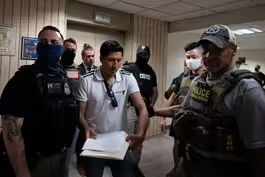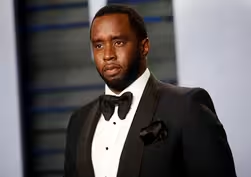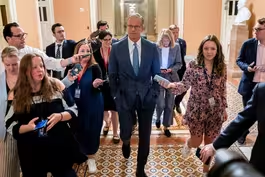
What's behind the efforts to reshape how history is taught
Clip: 7/1/2025 | 8m 52sVideo has Closed Captions
A look at what's behind the efforts to reshape how American history is taught
In the last decade, at least 20 states have passed laws or policies that restrict how history can be taught in schools. Since taking office, President Trump has pushed further with executive orders that aim to reshape how U.S. history is presented not only in classrooms, but in some of the nation’s most famous museums. Paul Solman reports. It’s for our Art in Action series and CANVAS coverage.
Problems playing video? | Closed Captioning Feedback
Problems playing video? | Closed Captioning Feedback
Major corporate funding for the PBS News Hour is provided by BDO, BNSF, Consumer Cellular, American Cruise Lines, and Raymond James. Funding for the PBS NewsHour Weekend is provided by...

What's behind the efforts to reshape how history is taught
Clip: 7/1/2025 | 8m 52sVideo has Closed Captions
In the last decade, at least 20 states have passed laws or policies that restrict how history can be taught in schools. Since taking office, President Trump has pushed further with executive orders that aim to reshape how U.S. history is presented not only in classrooms, but in some of the nation’s most famous museums. Paul Solman reports. It’s for our Art in Action series and CANVAS coverage.
Problems playing video? | Closed Captioning Feedback
How to Watch PBS News Hour
PBS News Hour is available to stream on pbs.org and the free PBS App, available on iPhone, Apple TV, Android TV, Android smartphones, Amazon Fire TV, Amazon Fire Tablet, Roku, Samsung Smart TV, and Vizio.
Providing Support for PBS.org
Learn Moreabout PBS online sponsorshipAMNA NAWAZ: In the last decade, at least 20 states have passed laws or policies that restrict how history can be taught in schools.
Since taking office in January, President Trump has pushed even further with executive orders that aim to reshape how U.S. history is presented, not only in classrooms, but in some of the nation's most famous museums.
Paul Solman reports for our series Art in Action.
JULIA JONES, National History Day Finalist: The graduating classes remained almost 100 percent white until 1969.
PAUL SOLMAN: For eighth grader Julia Jones, U.S. history.
JULIA JONES: They're like, wasn't Brown v. Board 1954?
That doesn't seem right.
PAUL SOLMAN: Classes at her own Richmond, Virginia, middle school.
JULIA JONES: When the 1970 school year started, there were about 5,000 white students who never came back.
PAUL SOLMAN: Jones was competing in National History Day in College Park, Maryland, one of some 3,000 students from around the country.
JULIA JONES: In school, we often learned that, after 1954, now schools were integrated.
Now black and white students could learn together and it's a big victory.
But then, when you learn this history, you realize that it really wasn't the case.
PAUL SOLMAN: Students pick their own topics, drafting the Declaration of Independence, the evolution of labor unions, Japanese internment camps during World War II.
CATHY GORN, National History Day: We are telling the kids that you have to look at all the angles and you have to back up what you're saying with evidence.
PAUL SOLMAN: Cathy Gorn runs national history day, held every year since 1974.
CATHY GORN: You guys pick me a winner?
PAUL SOLMAN: But this year is different after federal cuts hit home in April.
CATHY GORN: We had two grants and the total amount we lost was $336,000, right in the middle of everything.
PAUL SOLMAN: The grants were among more than 1,000 terminated at the National Endowment for the Humanities.
Private donors bailed out this year's competition, but the cloud hovers.
CATHY GORN: Our teachers in some areas are being told that they can't teach certain subject areas.
Some teachers have left the classroom because they have thought, if I can't teach truth, then I'm not going to stay here.
PAUL SOLMAN: So what's driving the cuts?
MAN: So I think we have ended up with really the wrong approach to historical education.
GREG GUTFELD, FOX News Anchor: It's way worse than that.
Wokeness has become the new curriculum.
DONALD TRUMP, President of the United States: We have an education system that teaches our children to be ashamed of themselves, in many cases, to hate our country.
PAUL SOLMAN: In January, the president signed an executive order promoting patriotic, as opposed to supposedly woke, education.
MIKE GONZALEZ, Heritage Foundation: America should not be felt that they have to live in shame or that there is a collective guilt to be carried.
PAUL SOLMAN: Mike Gonzalez, who fled Fidel Castro's Cuba as a child in the '70s, works for The Heritage Foundation and helped write Project 2025, the conservative blueprint for President Trump's second term.
Do you think America has or has had a racism problem?
MIKE GONZALEZ: Yes, I mean, we had systemic racism.
If you were a Black couple in Alabama in 1950, you couldn't go to the lunch counter and get a sandwich.
Yes, I would call that a racism problem.
PAUL SOLMAN: Do we still have it?
MIKE GONZALEZ: I think there are individual racists.
I think there's ugly racism.
But, by the way, and I think just -- so we should be ever vigilant and prosecute these things.
We haven't been able to get rid of murder, rape, theft.
We're probably not going to be able to get rid of racism.
PAUL SOLMAN: So how do we strike the right balance in teaching, commemorating, let's say, the history of slavery or Jim Crow or the civil rights movement?
MIKE GONZALEZ: I think you have to put it in the proper context.
I don't know anybody who says, no, we cannot teach about slavery.
But you have to also add 12 million Africans were bought in the continent of Africa, made it across to the New World.
Of that, 400,000 came here, in other words, 3 percent.
Slavery was practiced in the rest of the Americas extensively, much more extensively than here, in my own country of birth, and was practiced in biblical times, practiced in antiquity.
So there's a long history of man not being kind to man.
PAUL SOLMAN: In March, President Trump followed up with another executive order targeting museums, directing Vice President Vance to remove divisive and anti-American ideology from Smithsonian galleries in Washington and New York.
It's now in effect.
MIKE GONZALEZ: Lonnie Bunch, who is today the secretary of the Smithsonian, he was the head of the African American History Museum, and he ordered the curators to start collecting and curating materials from the Ferguson riots and from the Black Lives Matter demonstrations and riots from that point on.
There is some of that today and still in the museum, but it's being cut back severely.
PAUL SOLMAN: The Smithsonian had no comment about those specific cuts, but the board has stated that museums - - quote -- "must be a welcoming place of knowledge and discovery for all Americans and do more to further foundational values."
PHILLIP HOWARD, The Conservation Fund: This is the march route that marchers took led by Dr. King in 1965.
PAUL SOLMAN: For those who protect historic sites, the work now feels more urgent.
Phillip Howard is a civil rights preservationist in Alabama.
PHILLIP HOWARD: I don't believe this work is controversial.
I believe it is just as important to protect this history as it is to protect battlefields of the Civil War, our homes of our founding fathers.
PAUL SOLMAN: Even though the Trump administration, at least at the moment, is trying to reframe history to make it more positive.
PHILLIP HOWARD: I don't think there is a more positive American story than the civil rights movement.
PAUL SOLMAN: In March, the Montgomery bus station, home to the Freedom Rides Museum, was one of more than 400 federal buildings deemed not -- quote -- "core to government operations" and slated for sale.
After an uproar, however, the museum was dropped from the list.
PHILLIP HOWARD: The challenges we face today are minuscule compared to the history we're trying to preserve.
PAUL SOLMAN: Howard crisscrosses Alabama and Mississippi for The Conservation Fund, a real estate nonprofit that partners with local communities to protect historic sites.
PHILLIP HOWARD: Raise your hand if you were on the bridge on Bloody Sunday.
PAUL SOLMAN: A recent stop, Zion Church in Marion, Alabama, where a memorial service was held in 1965 for Jimmie Lee Jackson, a young civil rights activist killed by Alabama police, a death that helped spark the Selma-to-Montgomery March.
PHILLIP HOWARD: And what would you all think your legacies should be?
WOMAN: For people to continue on with the fight and to know that it didn't come easy.
WOMAN: We need to know the history so hopefully we don't repeat it.
PAUL SOLMAN: Last stop, in Selma.
PHILLIP HOWARD: The Edistone Hotel built in 1855.
PAUL SOLMAN: Where recently freed Blacks came for food, shelter and medical care following the Civil War.
PHILLIP HOWARD: This building would have been one of the first places in the South where an African American person would have been treated like a human.
Even though there are challenges, it's nothing that these communities haven't seen before.
They will come out of this stronger than ever.
This history will be preserved.
PAUL SOLMAN: But Gonzalez says that's also his goal, except put into context.
MIKE GONZALEZ: America is not a lost experiment because of its history.
On the contrary, America is an experiment in freedom.
So, we're not systemically guilty.
We did these things.
These things happen.
All of us in every country on earth, we should learn about them and we should also understand the good.
This is a great country that people should be proud of and people should be inspired by.
CATHY GORN: Well, those folks out there that are saying that, if we teach complete history, if we teach the tragic parts of our past, that we're going to be making kids feel bad or we're going to be making them feel guilty, right, the exact opposite is true.
It gives them a greater understanding of how Americans have worked so hard to make their country better.
And then when you do that, you are helping to create thoughtful, informed patriots, not blind ones.
PAUL SOLMAN: But the future of how U.S. history is told up, as it long has been, for debate.
For the "PBS News Hour," Paul Solman.
New poll reveals Americans' views on key Trump policies
Video has Closed Captions
Clip: 7/1/2025 | 4m 40s | New poll reveals Americans' views on key Trump policies (4m 40s)
News Wrap: 'Diddy' jury told to continue deliberating
Video has Closed Captions
Clip: 7/1/2025 | 7m 12s | News Wrap: 'Diddy' jury reaches verdict on 4 of 5 counts and told to continue deliberating (7m 12s)
New twice-yearly drug prompting hopes of curbing HIV cases
Video has Closed Captions
Clip: 7/1/2025 | 7m 17s | How a new twice-yearly drug is prompting hopes of curbing HIV cases (7m 17s)
Solar industry fears demand will drop as tax credits end
Video has Closed Captions
Clip: 7/1/2025 | 5m 45s | Rooftop solar industry fears demand will collapse as GOP rolls back tax credits (5m 45s)
Trump administration withholds weapons promised to Ukraine
Video has Closed Captions
Clip: 7/1/2025 | 5m 25s | U.S. withholds weapons promised to Ukraine as Russian forces gain more territory (5m 25s)
Trump visits 'Alligator Alcatraz' migrant detention facility
Video has Closed Captions
Clip: 7/1/2025 | 6m 4s | Trump visits Florida's 'Alligator Alcatraz,' urges more states to open ICE detention sites (6m 4s)
What's in the version of Trump's bill passed by the Senate
Video has Closed Captions
Clip: 7/1/2025 | 6m 45s | What's in the version of Trump's bill passed by the Senate and its chances in the House (6m 45s)
Providing Support for PBS.org
Learn Moreabout PBS online sponsorshipSupport for PBS provided by:
Major corporate funding for the PBS News Hour is provided by BDO, BNSF, Consumer Cellular, American Cruise Lines, and Raymond James. Funding for the PBS NewsHour Weekend is provided by...


















